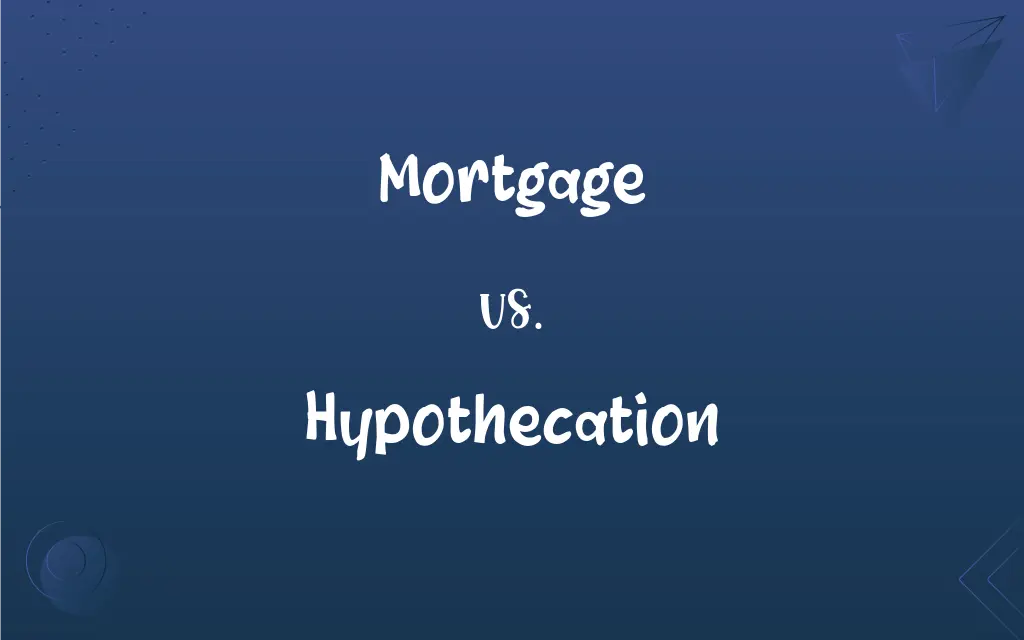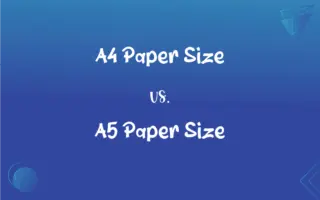Mortgage vs. Hypothecation: What's the Difference?
Edited by Aimie Carlson || By Harlon Moss || Published on January 31, 2024
A mortgage is a loan secured by real property, while hypothecation is the pledging of assets as collateral without transferring ownership.

Key Differences
A mortgage is a specific type of loan where real estate is used as collateral, with the property being transferred to the lender if the borrower defaults. Hypothecation involves pledging assets as collateral while retaining ownership and use of the assets.
Mortgages are typically used for financing the purchase of real estate, with the property itself securing the loan. In hypothecation, various types of assets, including but not limited to real estate, can be used as collateral.
The key feature of a mortgage is the transfer of legal title to the lender with the condition of reconveyance upon repayment. Hypothecation does not involve a transfer of title but grants a lien or charge on the assets.
In a mortgage, failure to repay the loan results in foreclosure, where the lender can sell the property to recover the debt. With hypothecation, if the borrower defaults, the lender may seize the collateral, but ownership remains with the borrower until such action.
Mortgages are commonly associated with real estate transactions and are heavily regulated. Hypothecation is used in various finance areas, including securities, vehicle loans, and business financing.
ADVERTISEMENT
Comparison Chart
Definition
Loan secured by real property
Pledging assets as collateral
Ownership Transfer
Legal title transferred to lender
No transfer of title, but lien created
Collateral Type
Primarily real estate
Various assets, including securities and goods
Default Consequence
Foreclosure and sale of the property
Seizure of collateral without ownership change
Common Use
Real estate financing
Securities, vehicle loans, business financing
ADVERTISEMENT
Mortgage and Hypothecation Definitions
Mortgage
A legal agreement by which a bank lends money in exchange for taking title of the debtor's property.
They took out a mortgage to buy their first house.
Hypothecation
Retaining ownership of collateral while obtaining a loan.
The company's equipment was hypothecated to secure the credit line.
Mortgage
A loan in which property or real estate is used as collateral.
They paid off their mortgage after 30 years.
Hypothecation
A legal right given to a creditor over the borrower's asset.
Hypothecation was agreed upon for the term of the loan.
Mortgage
The charging of real property by a debtor to a creditor as security for a debt.
The farm was put up as a mortgage for the loan.
Hypothecation
Pledging movable or immovable assets without delivering them to the creditor.
The car was hypothecated, but she continued to use it.
Mortgage
A conveyance of title to property that becomes void upon payment of the loan.
The mortgage agreement was recorded at the local registry.
Hypothecation
The practice of borrowers pledging collateral to secure a debt.
Hypothecation is common in margin trading.
Mortgage
The amount of money borrowed against a property.
Their mortgage on the new home was substantial.
Hypothecation
Offering an asset as collateral security for a debt.
He used his stock portfolio for hypothecation in the business loan.
Mortgage
A loan for the purchase of real property, secured by a lien on the property.
Hypothecation
To pledge (property) as security or collateral without delivery of title or possession.
Mortgage
The document specifying the terms and conditions of the repayment of such a loan.
Hypothecation
Usage Problem To hypothesize.
Hypothecation
The use of property, or an existing mortgage, as security for a loan, etc.
Hypothecation
(British) A tax levied for a specific expenditure.
Hypothecation
The act or contract by which property is hypothecated; a right which a creditor has in or to the property of his debtor, in virtue of which he may cause it to be sold and the price appropriated in payment of his debt. This is a right in the thing, or jus in re.
There are but few cases, if any, in our law, where an hypothecation, in the strict sense of the Roman law, exists; that is a pledge without possession by the pledgee.
Hypothecation
A contract whereby, in consideration of money advanced for the necessities of the ship, the vessel, freight, or cargo is made liable for its repayment, provided the ship arrives in safety. It is usually effected by a bottomry bond. See Bottomry.
FAQs
What is a mortgage?
A loan secured by real property as collateral.
Can a mortgage be transferred?
Yes, but it usually requires the lender's approval.
Are mortgages only for real estate?
Primarily, though some types may cover other assets.
How does a mortgage work?
The borrower pledges real estate to the lender for a loan.
Can hypothecated assets be used?
Yes, the borrower retains use of the assets.
What happens if a mortgage is not paid?
The lender can foreclose on the property.
Can hypothecation be part of a mortgage?
In some cases, yes, as additional security.
What happens if a hypothecated loan defaults?
The lender may seize the collateral.
What is hypothecation?
Pledging assets as collateral while retaining ownership.
How is hypothecation used?
Commonly in loans, margin trading, and vehicle financing.
How are these terms used in different countries?
Legal specifics can vary by jurisdiction.
Are these concepts applicable in personal finance?
Yes, in various loan and credit scenarios.
Are both mortgage and hypothecation legally binding?
Yes, they're enforceable contracts.
Can either be renegotiated?
Yes, subject to lender's agreement and terms.
Can you hypothecate real estate?
Yes, though it's more common with movable assets.
Can both be used for business loans?
Yes, depending on the nature of the collateral.
Is hypothecation limited to specific assets?
No, it can apply to various asset types.
How does foreclosure differ in each?
Foreclosure is specific to mortgages for property.
What's the difference in risk between the two?
Mortgages often involve higher-value assets.
Do both require insurance on the collateral?
Typically, especially for high-value assets.
About Author
Written by
Harlon MossHarlon is a seasoned quality moderator and accomplished content writer for Difference Wiki. An alumnus of the prestigious University of California, he earned his degree in Computer Science. Leveraging his academic background, Harlon brings a meticulous and informed perspective to his work, ensuring content accuracy and excellence.
Edited by
Aimie CarlsonAimie Carlson, holding a master's degree in English literature, is a fervent English language enthusiast. She lends her writing talents to Difference Wiki, a prominent website that specializes in comparisons, offering readers insightful analyses that both captivate and inform.






































































